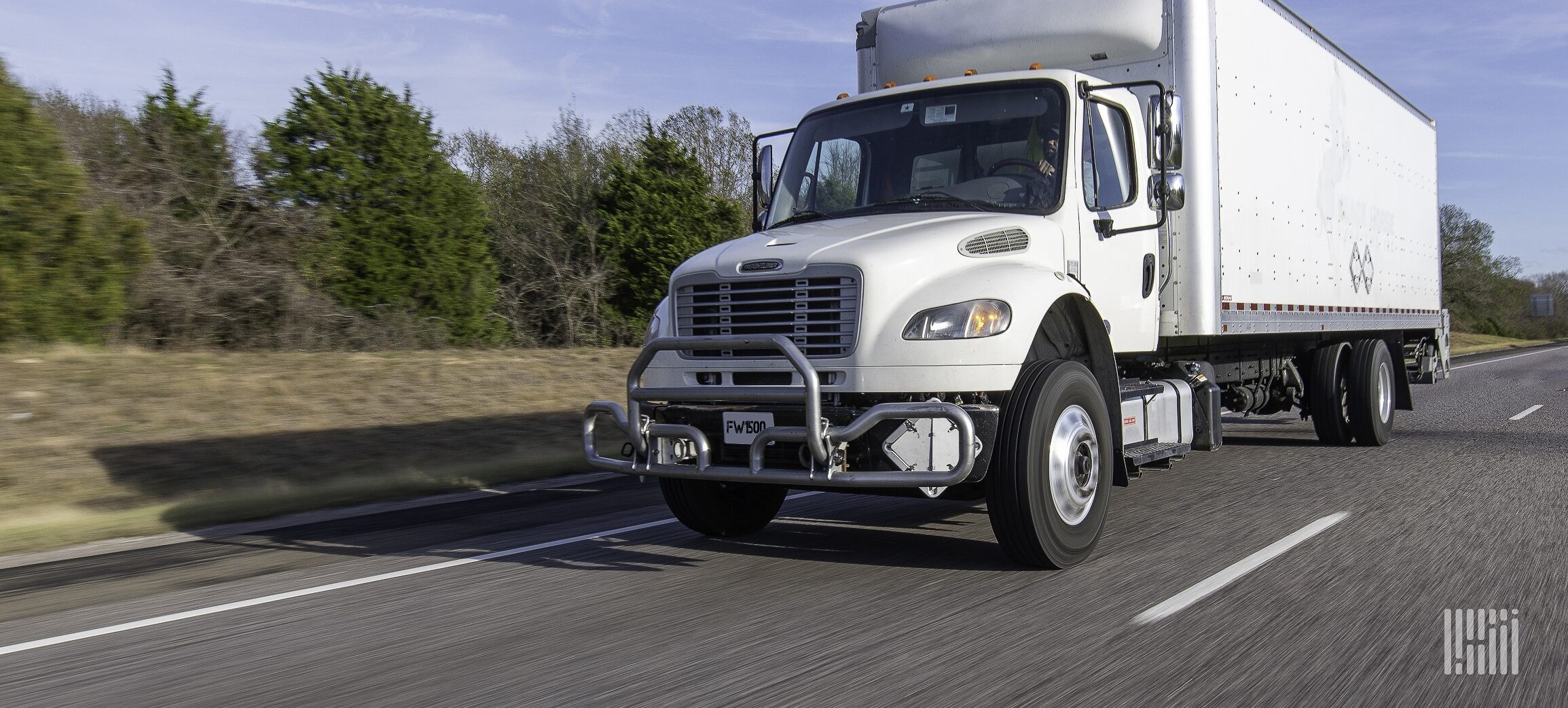Owning and operating your own box truck can provide the freedom of being your own boss along with the ability to make a healthy income. However, it requires following the proper steps to legally and safely get your trucking business off the ground.
This article outlines the key steps from obtaining your commercial driver’s license to purchasing a truck to securing operating authority. Find out how you can begin working for yourself as a box truck owner operator. And when you’re finished reading, check out these other articles in our ‘How to become a box truck owner operator’ series:
- 9 steps to become a box truck owner operator
- How much does box truck insurance cost?
- Best box truck financing options
- 7 tips for evaluating box truck dispatch services
Key takeaways
- Owning a box truck offers the freedom of being your own boss while providing the potential for a healthy income, but it requires careful planning and compliance with regulations.
- Owner operators need to purchase or finance their trucks and actively seek contracts, which involves building relationships and managing expenses.
- Earnings can range from $50,000 to over $150,000 annually, influenced by factors like experience, market conditions, and the types of loads transported.
- While the independence and potential for higher income are appealing, owner operators face challenges such as high initial investments, irregular income, and the burden of administrative tasks.
- Success as a box truck owner operator requires a combination of driving skills, business acumen, and a commitment to safety and compliance.
What is a box truck owner operator?
A box truck owner operator is someone who owns and operates their own box truck to transport cargo and freight for clients. Here are some key details about being a box truck owner operator:
- Truck ownership: The owner operator purchases, finances or leases their own box truck, typically a 16′ to 26′ straight truck with an enclosed cargo area. This allows them to have full control and flexibility over their business.
- Box truck contracts: The owner operator seeks out owner box truck jobs from truck load boards, freight brokers, forwarders, shippers, etc. This involves a lot of relationship building and sales skills to secure reliable loads. They may focus on certain industries like general freight, produce, or trade shows.
- Expense management: As a small business owner, the operator has to pay for all costs like fuel, maintenance, registration, insurance, accounting services, etc. Maximizing profitability means keeping expenses in check.
- Driving: The operator does all their own driving, unlike those who hire employees or use sub-contractors. This provides freedom but requires meeting all DOT regulations as a driver. Long-haul, over-the-road (OTR) trucking routes mean being on the road for extended periods.
- Customer service: It’s up to the operator to provide quality, reliable service to customers. This includes careful handling of cargo, consistent communication, and building a reputation for on-time delivery.
- Growth potential: Many start as owner operators and eventually expand to add trucks and drivers. This allows them to focus less on driving and more on sales, management, and hiring other box truck drivers
How much do box truck owners make?
Getting down to business, exactly how much does a box truck owner make? That depends on factors like experience, business costs, types of loads, and routes driven. Here’s an overview of box truck owner operator pay.
- Average earnings: The typical range is $50,000 to $100,000 per year. Very profitable operators can earn over $150,000, according to October 2024 ZipRecruiter estimates. Keep in mind that a lot depends on your specific market and living costs. For example, you can charge much more for moving truck costs in one state versus another, but taking into account fuel prices and other expenses, you could still turn less profit.
- Per mile rates: A common earnings metric is per mile rates, which range from $1.20 to $3.00+ per mile on average. Long haul runs pay the highest per mile.
- Percentage of load revenue: Some operators earn a percentage of the total load revenue, such as 70% to 90% of the load price.
- Hourly earnings: Operators will sometimes negotiate an hourly rate for local pick-up/delivery services, ranging from $25-$60 per hour.
- Expenses: Owners must cover truck payments, fuel, maintenance, insurance, fees, accounting services, etc. These expenses can total 40-60% of revenue.
- Ownership: Drivers who fully own their truck (no financing) tend to earn higher incomes after expenses.
- Experience: Earnings potential tends to increase the longer an operator is in business and has built a strong customer base.
While there is significant earning potential, it takes business acumen and hard work building client relationships as an owner operator. And you’ll have to learn how to get box truck contracts. But the freedom and flexible schedule appeals to many drivers.
Types of box truck loads
Here are some of the most common types of loads transported by box truck owner operators.
- General freight: This refers to palletized goods, boxes, crates, etc. that need LTL (less than truckload) shipping. It may refer to box truck freight contracts for appliances, building materials, and consumer goods. General freight makes up a large portion of box truck loads.
- Food and beverage: Box trucks are ideal for hauling expedited perishable foods like produce, meats, dairy products, and beverages. Transportation is temperature controlled. Loads come from farms, processors, and distribution centers.
- Parcel and package: With the rise in e-commerce, more box trucks are handling loads of parcels, packages, and envelopes for delivery companies. These are time sensitive shipments.
- Trade show and events: Box trucks transport exhibit materials, booths, banners, audio/visual equipment for conventions, expos, and other events. Box truck operators work with show coordinators on tight loading schedules.
- Household goods: People often hire box trucks when moving residences or offices. These box truck owner jobs entail providing door-to-door service for furniture, boxes, and other household items.
- Retail and wholesale supply: Stores, warehouses, and showrooms receive inventory replenishments via box truck load contracts. Things like retail merchandise, spare parts, janitorial supplies.
- Final mile delivery: More operators focus on final mile delivery of large/heavy items like appliances, mattresses, fitness equipment from distribution hubs to homes.
So box truck owner operators have flexibility in the types of commodities and industries they service with their truck. Building diverse cargo experience can expand business opportunities.
Pros and cons of box truck owner operator jobs
Box truck owner operator jobs offer drivers the opportunity to run their own business, which can be a blessing and a curse. While the career path is rewarding for those with an entrepreneurial spirit, it does require a lot of work — especially at the beginning.
Here are the trade-offs that prospective box truck owner operators should consider.
Pros
- Independence and flexibility: Owner operators have the freedom to set their own schedules and choose which jobs to accept.
- Potential for higher income: Without a trucking company taking a cut, owner operators can potentially earn more than company drivers.
- Ability to choose routes and clients: This allows for better work-life balance and the option to specialize in certain types of cargo or areas.
- Tax benefits: As a business owner, you can deduct various expenses related to your operation, potentially lowering your tax burden.
- Opportunity for growth: With hard work, a good strategy, and some luck, one box truck and a load board subscription could eventually turn into a large trucking fleet.
Cons
- High initial investment: Purchasing a box truck requires significant upfront capital or taking on debt.
- Responsibility for operational costs: All expenses, from fuel to repairs, come out of your pocket, which can be substantial.
- Irregular income: Unlike a steady paycheck, earnings can fluctuate based on available jobs and market conditions.
- Administrative burden: You’ll need to handle tasks like finding owner operator box truck jobs, managing finances, and ensuring compliance with FMCSA regulations.
- Longer working hours: Owner operators often work more than standard drivers, dealing with both driving and business management.
- Business stress: The pressure of running your own operation and ensuring its success can be mentally and emotionally taxing.
9 steps to become a box truck owner operator
Here are the typical steps someone would take to become an independent box truck driver:
1. Get a CDL: You’ll need a commercial driver’s license (CDL) to operate a large box truck (over 26,000 lbs). You’ll need to pass the written exams for a Class B CDL before considering any box truck work.
2. Gain driving experience: Many operators start by gaining experience driving for a trucking company before considering independent box truck jobs. This provides valuable knowledge before operating independently and seeking out their own box truck contracts.
3. Create a business plan: Analyze costs, create financial projections, evaluate insurance/risks, outline marketing plans, etc. This will provide direction.
4. Buy a truck: Research and purchase or finance a box truck. 16′ to 26′ trucks with lift gates are common. Factor in maintenance costs.
5. Get operating authority: File for motor carrier authority and get a DOT number to haul loads across state lines legally. Get business licenses.
6. Get insurance coverage: Obtain proper commercial auto liability, cargo, collision, health, and workers comp insurance to protect your business.
7. Offer services to clients: Start marketing services, build a customer base, and establish independent box truck contracts with brokers/forwarders to acquire loads.
8. Manage finances and expenses: Set up accounting systems to manage income, expenses, tax payments, etc. Keep costs low to maximize profitability.
9. Focus on safety and compliance: Follow all DOT regulations in truck maintenance, load securing, driving hours, inspections, etc. to ensure safety and legal compliance.
With the right preparation, licenses, reliable equipment, business knowledge, and driving skills, you can start up your own business and begin looking for box truck owner operator jobs.
Ready to start taking owner operator box truck jobs?
Becoming a successful box truck owner operator takes research, preparation, and commitment. Still, if you’re motivated and have a passion for the open road, owning your own trucking business can be very rewarding.
By following the steps outlined here for licensing, financing, operations and more, you could soon be well on your way to a life of freedom and opportunity as box trucking owner operator.
FAQ
Owning a box truck can be a good investment for those wanting to start their own transportation company with the freedom of being an owner operator. However, the work requires strong business skills and the financial means to purchase, register, and maintain the vehicle properly.
Box trucks are vital for transporting and delivering all kinds of commercial goods for businesses, from raw materials to finished products to merchandise inventory. They provide flexible, economical, door-to-door shipping for a wide range of industries.
A box truck owner operator can make an average annual income of $50,000 to $100,000, with top earners bringing in even more money after covering business expenses. Earnings depend on factors like miles driven, operating costs, and rates negotiated per load.
Owning a box truck can be quite profitable, depending on demand in your area, operating costs, and how effectively you manage contracts and clients. With proper planning and efficient operations, many box truck owners see a good 15-30% annual return on investment.
The highest paying owner operator jobs typically include specialized freight logistics transport like oversized loads, hazardous materials, or refrigerated goods. Ultimately it varies based on demand, operational efficiency, and the ability to secure profitable contracts.




